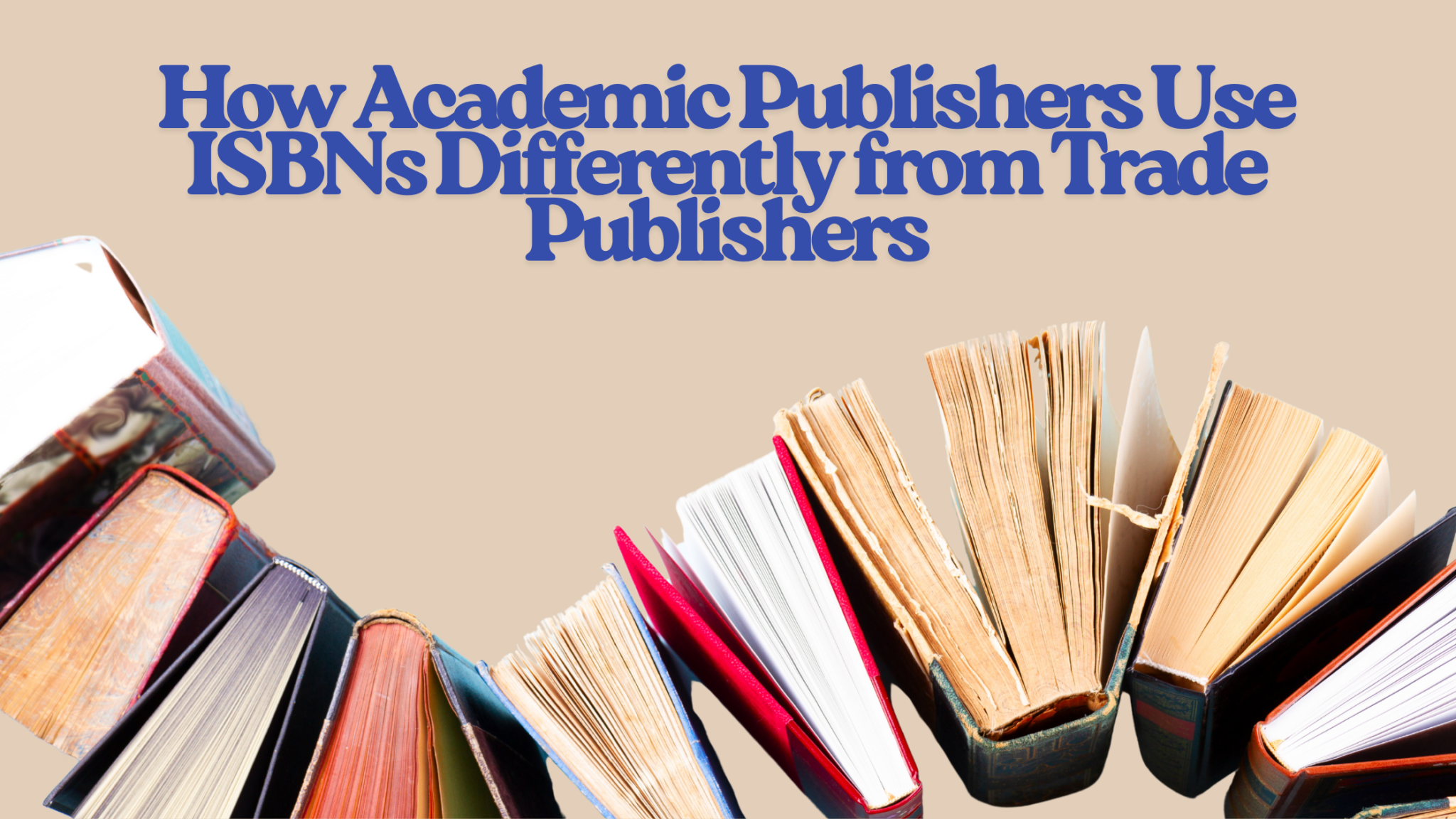
Both trade and academic publishers use ISBNs, but their distinct goals and business models lead them to use this identifier in different ways. For trade publishers, the ISBN is a key tool for commercial logistics and retail management. In contrast, for academic publishers, it serves as a cornerstone for scholarly legitimacy, archival permanence, and discoverability.

Trade publishing is a commercial industry driven by sales to the general public. For these publishers, the International Standard Book Number (ISBN) is more than just a number; it’s the linchpin of their business operations and a vital part of the global book supply chain. Its primary function is to facilitate the seamless movement of books from the publisher to the consumer.
The ISBN as a Retail and Marketing Tool At its core, the ISBN is a unique product identifier. Every distinct format of a book, whether it’s a hardcover, a paperback, an e-book (e.g., EPUB, MOBI, or PDF), or an audiobook, requires its own unique ISBN. This is critical for preventing order errors and ensuring the correct product is delivered. For a trade publisher, the ISBN is the foundational data point that links a book to its rich metadata. This metadata, which includes the title, author, price, publication date, and a brief description, is what populates online bookstores like Amazon and Barnes & Noble, as well as the databases used by wholesalers and libraries.
The ISBN is also the number that is encoded into the EAN-13 barcode (European Article Number) that appears on the back cover of a physical book. This barcode is what’s scanned at the point of sale, enabling real-time inventory management, sales data tracking, and replenishment orders. Without a unique ISBN, a book simply wouldn’t exist in the modern retail ecosystem.
The ISBN in the Publishing Lifecycle The ISBN’s role begins long before a book hits the shelves. It’s assigned during the pre-publication phase and is used by publishers to track a book through its entire lifecycle, from editorial and production to marketing and distribution. The ISBN is a standard requirement for listing a book in major bibliographic databases which is the primary source of information for booksellers and librarians worldwide. This listing ensures that a book is discoverable and can be ordered by anyone in the world. Trade publishers may also register different versions of a book with new ISBNs to track different marketing strategies, such as a “movie tie-in” edition with a special cover.

Academic publishing, often managed by university presses and specialized academic publishers, has a different mission: the dissemination of scholarly knowledge to a specific audience of researchers, students, and professionals. Here, the ISBN’s value lies not in its commercial function, but in its role as a permanent, unambiguous identifier for a work of scholarship.
In the academic world, the ISBN is a key indicator of a work’s formal publication status. It differentiates a peer-reviewed monograph or textbook from an informal paper or a journal article, which uses a different identifier, the International Standard Serial Number (ISSN).
The ISBN ensures that a book can be accurately cited and referenced in academic bibliographies and research papers, a fundamental practice in scholarly communication. By assigning an ISBN, a university press or academic institution is essentially validating a work as a permanent part of the scholarly record.
For academic publishers, the ISBN is a critical tool for long-term archiving and preservation. Unlike a trade book that may go out of print, an academic work is expected to remain accessible for generations of scholars. By cataloging books with ISBNs, academic presses ensure their works are properly indexed in major academic databases like JSTOR, ProQuest, and WorldCat, as well as in university and national library systems. This makes the work discoverable and accessible to researchers globally, fulfilling the core mission of knowledge preservation.
Academic publishing often uses a more intricate system of identifiers. For example, a single academic series might have both an ISSN (to identify the series as an ongoing publication, like the “Cambridge Studies in History”) and an ISBN for each individual book within that series (e.g., the ISBN for “Volume 10 of the Cambridge Studies in History”). This dual system provides a layered level of identification that is essential for both bibliographic control and scholarly citation. Furthermore, academic institutions may assign ISBNs to works that are not intended for commercial sale, such as a doctoral dissertation or a conference proceeding, purely for the purpose of making them officially part of the scholarly record and findable in library catalogs.
Ultimately, the divergent use of the ISBN by trade and academic publishers is a perfect reflection of their contrasting purposes. For a trade publisher, the ISBN is a SKU (Stock Keeping Unit), a crucial element in a commercial machine designed for efficient sales and distribution. For an academic publisher, it is a scholarly fingerprint, an immutable identifier that ensures a work’s legitimacy, discoverability, and permanent place in the intellectual history of a discipline. The same 13-digit code serves two entirely different masters, highlighting the distinct worlds of commercial and academic publishing.
A1: Yes, absolutely. Even if a book is not intended for widespread commercial sale, an ISBN is crucial for ensuring the work is properly cataloged in library systems and academic databases. This makes it discoverable for future researchers and scholars, fulfilling the core mission of academic publishing.
A2: Yes, this is a common practice in academic publishing, particularly for books that are part of a larger, ongoing series or collection. The ISBN identifies the individual volume, while the ISSN identifies the entire series.
A3: While not strictly required by law, an ISBN is highly recommended for any author, academic or otherwise, who wants their book to be listed in major databases and sold through online retailers or bookstores. It provides legitimacy and makes the book part of the official publishing record.
